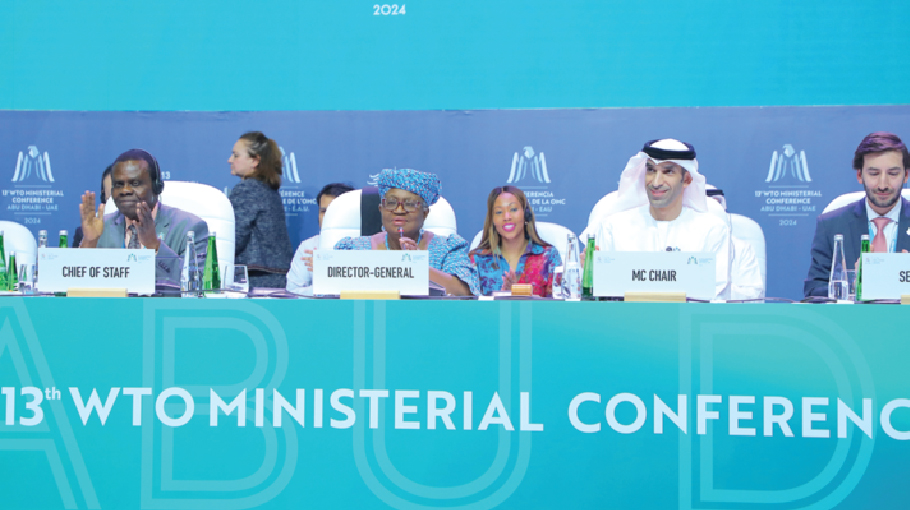MC13 ends with decisions on dev, dispute settlement reform
Commitment to continue ongoing talks

WTO members concluded the 13th Ministerial Conference (MC13) in Abu Dhabi on 2 March with the adoption of a Ministerial Declaration setting out a forward-looking, reform agenda for the organization.
Ministers also took a number of ministerial decisions, including renewing the commitment to have a fully and well-functioning dispute settlement system by 2024 and to improve use of the special and differential treatment (S&DT) provisions for developing and least developed countries (LDCs).
They also agreed to continue negotiations in all areas where convergence was elusive at MC13.
The Ministerial Conference brought together nearly 4,000 ministers, senior trade officials and other delegates from the WTO's 164 members and observers as well as representatives from civil society, business and the global media. Initially scheduled for 26-29 February, the Conference was extended in a final push to reach outcomes on the various issues at stake.
Members adopted the Abu Dhabi Ministerial Declaration, where they committed to preserve and strengthen the ability of the multilateral trading system, with the WTO at its core, to respond to current trade challenges.
The Ministerial Declaration underlines the centrality of the development dimension in the work of the WTO, recognizing the role that the multilateral trading system can play in contributing towards the achievement of the UN 2030 Agenda and its Sustainable Development Goals.
It also recognized the contribution of women's economic empowerment and women's participation in trade to economic growth and sustainable development.
Members recognised the role and importance of services to the global economy as it generates more than two-thirds of global economic output and accounts for over half of all jobs.
They encouraged the relevant WTO bodies to continue their work to review and build on all the lessons learned during the COVID-19 pandemic and to build effective solutions in case of future pandemics in an expeditious manner.
Dr Thani bin Ahmed Al Zeyoudi, Minister of State for Foreign Trade of the United Arab Emirates (UAE) and MC13 Chair, thanked members for their active engagement during the Conference.
He noted that while not everything that delegations set out to accomplish could be delivered, the commitment shown will further strengthen the multilateral trading system. His full remarks are here.
On dispute settlement reform, members adopted a Ministerial Decision recognizing the progress made with the view to having a fully and well-functioning dispute settlement system accessible to all members by 2024.
Ministers instructed officials to accelerate discussions, build on the progress already made, and work on unresolved issues. WTO Director-General Ngozi Okonjo-Iweala stressed the progress made with contributions from members.
"Let’s continue to roll up our sleeves to advance this reform and deliver by 2024," she said.
Ministers adopted a Ministerial Decision that responds to a 23-year-old mandate to review special and differential treatment (S&DT) provisions for developing and least developed countries (LDCs) with a view to making them more precise, effective and operational.
"This is a win for development, one that will help enable developing countries, especially LDCs, fulfil their WTO commitments, exercise their rights and better integrate into global trade," said DG Okonjo-Iweala.
Earlier in the conference, ten WTO members - Brunei Darussalam, Chad, Malaysia, Norway, the Philippines, Rwanda, Saudi Arabia, South Africa, Togo, and Türkiye - deposited their instruments of acceptance of the Fisheries Agreement, bringing the total number of WTO members to have formally accepted the Agreement to 71 and putting the historic agreement for ocean sustainability on track for entry into force at a record pace.



